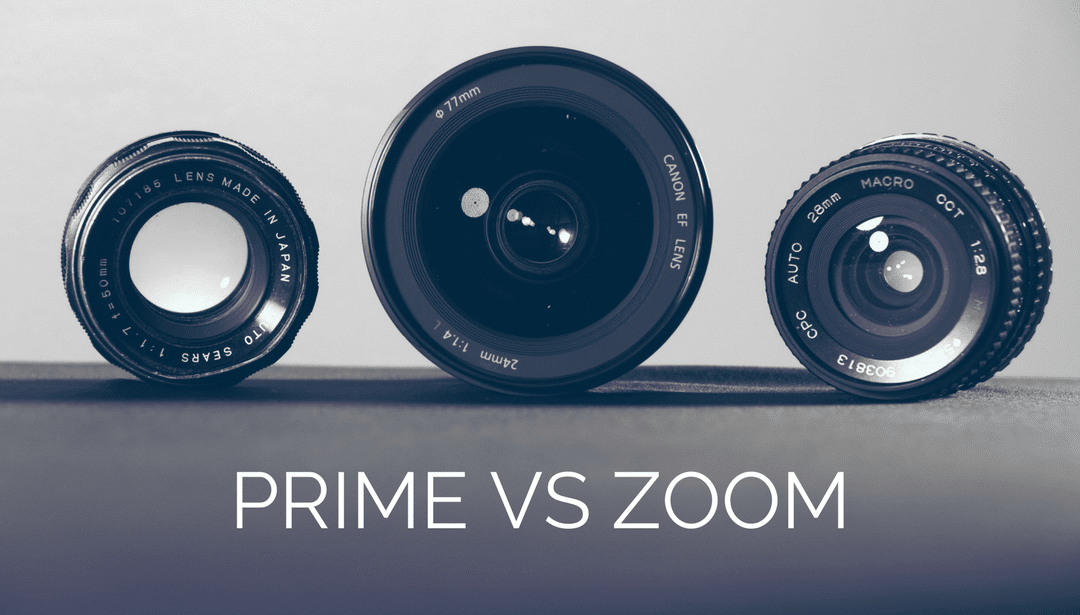
With so many different camera lenses out there, it’s hard to know what to choose when you’re first starting out! Prime, zoom, aperture range, macro, image stabilized… there’s so many from which to choose. To begin, let’s first talk about the main differences between these types of lenses.
Prime lens:
This is a lens that has a fixed focal length – which means the distance that the lens is zoomed in or out is fixed. So you would have to physically move forward or back from your subject. They have a wide range from wide to telephoto length lens. They typically have fewer elements inside, so they are lighter on your camera compared to zoom lenses of the same range. Since they are built for that specific focal length, they tend to be sharp across the entire image plane.
Zoom lens:
A zoom lens allows you to use a range of focal lengths within one lens. This makes it more convenient to the photographer versus a prime lens where you have to “move your feet”. There are more moving parts within the lens, however since the lens isn’t optimized for one specific length you have to find it’s sweet spot where it performs at it’s best.
You also will have to keep an eye on sharpness. Zoom lenses tend to lose their sharpness on the corners at the end of the zoom length. The aperture sometimes isn’t fixed either, so if it has a range of 3.5-5.6 it’s going to get smaller or more closed down as you zoom in your lens. If you do get a zoom lens, look for lenses that have around a 2.8 aperture range at all lengths.
Zoom lenses do offer image stabilization that you sometimes won’t find in prime lenses. This allows the ability to photograph at slower shutter speeds without worrying about blur that comes with camera shake.
Which should you choose?
As you’re getting started out in portrait photography, its best to try out the different types and see which one best fits the style you’re going for. You can do this by renting from someplace like BorrowLenses.com.
If you’re doing lifestyle, you might opt for the 35mm or 50mm. If you’re strictly doing senior portraits, you might go for a longer focal length like the 85mm.
If you’re a wedding or sports photographer, zoom lenses would give you more flexibility throughout the day. A 70-200mm is a great investment for both of these fields while the 24-70mm is also a favorite.
Since prime lenses have a larger aperture than zooms (some going down to even 1.2), this affects a few things in your images. One is the ability to photograph in low light. Since your aperature is wider, it allows more flexibility with your ISO and shutter speed in low light too. It also affects the bokeh or background blur in your final image. A wider aperature equals more shallow depth of field, which creates the creamy, out-of-focus background.
Building your lens bag
Don’t feel like you are limited to one or the other. Both types of lenses have something to offer depending on what you’re shooting. If you’re doing portrait photography, a standard 50mm 1.2 or 1.4 lens is a great start if you have the money to invest in it. If not, get the 1.8 which is less cost but still a great lens.
If you’re doing any type of event photography (like weddings), I recommend getting one prime lens like the 50 1.4 and a zoom lens like the 70-200mm 2.8. Then it’s a bonus if you get a 24mm or 35mm for getting those wider dancing shots at the reception.
Portraits, you can start with a 50mm 1.4 or 85mm 1.4 and build from there. If you’re doing newborn photography, you might get a macro lens or if you do lifestyle you might grab a 35mm. It all depends on your style!
In my opinion, the investment in your lenses is far more important than into your camera. Camera bodies change so rapidly, that you’ll end up upgrading at some point. And you can get this refurbished as they come out. However if you take care of your lenses, your lenses can last for a long time.
What lenses can you not live without? What did you first start out with? Let us know in the comments below!
—
Let’s grow your business in 2017! Sign up for a free 30 day trial with Iris and see how easily you can get your business organized and start saving time!


